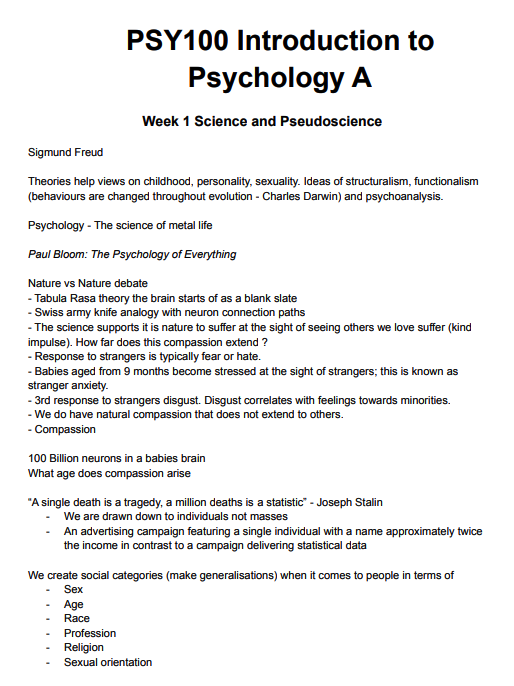PSY100 Introduction to Psychology
Summary:
The PSY100 Introduction to Psychology delves into a plethora of topics that lay the foundation for the scientific understanding of the human mind and behavior. Starting with the history of psychology, the course looks at theories propounded by key figures like Sigmund Freud, whose work influenced views on childhood, personality, and sexuality. The course also covers schools of thought including structuralism, functionalism, and psychoanalysis, emphasizing psychology as a science of mental life.
Notably, the course explores the Nature vs. Nurture debate, looking into theories like Tabula Rasa, which posits that the brain starts as a blank slate. This notion is contrasted by findings that suggest innate compassion and programmed responses to strangers, reinforcing that both nature and environment shape human psychology.
On the topic of social psychology, the course examines our response to different categories of people based on factors like sex, age, race, and religion. This helps to understand stereotypes and the potential negative consequences of them. The discussion moves into the realm of cognitive psychology, focusing on how we perceive and categorize information and people, ultimately affecting our interactions with the world.
The course includes practical components like activities and experiments.
Excerpt:
PSY100 Introduction to Psychology
PSY100 Introduction to
Psychology A
Week 1 Science and Pseudoscience
Sigmund Freud
Theories help views on childhood, personality, sexuality. Ideas of structuralism, functionalism (behaviours are changed throughout evolution – Charles Darwin) and psychoanalysis.
Psychology – The science of metal life
Paul Bloom: The Psychology of Everything
Nature vs Nature debate
– Tabula Rasa theory the brain starts of as a blank slate
– Swiss army knife analogy with neuron connection paths
– The science supports it is nature to suffer at the sight of seeing others we love suffer (kind impulse). How far does this compassion extend?
– Response to strangers is typically fear or hate.
– Babies aged from 9 months become stressed at the sight of strangers; this is known as stranger anxiety.
– 3rd response to strangers disgust. Disgust correlates with feelings towards minorities.
– We do have natural compassion that does not extend to others.
– Compassion


Reviews